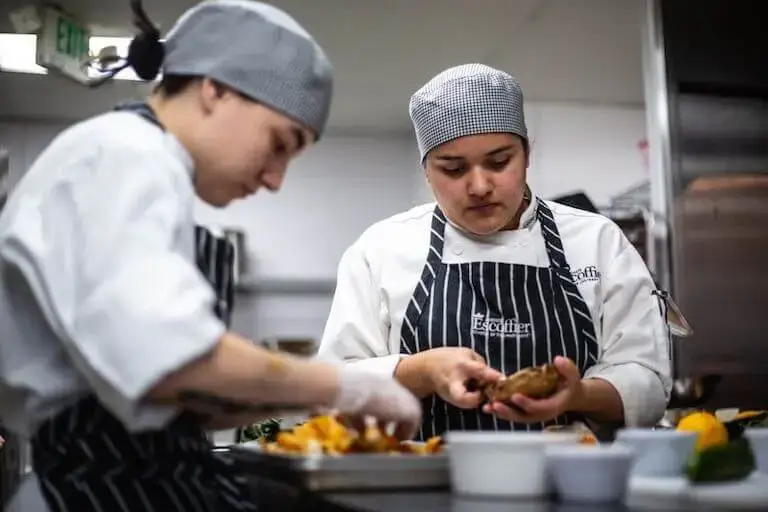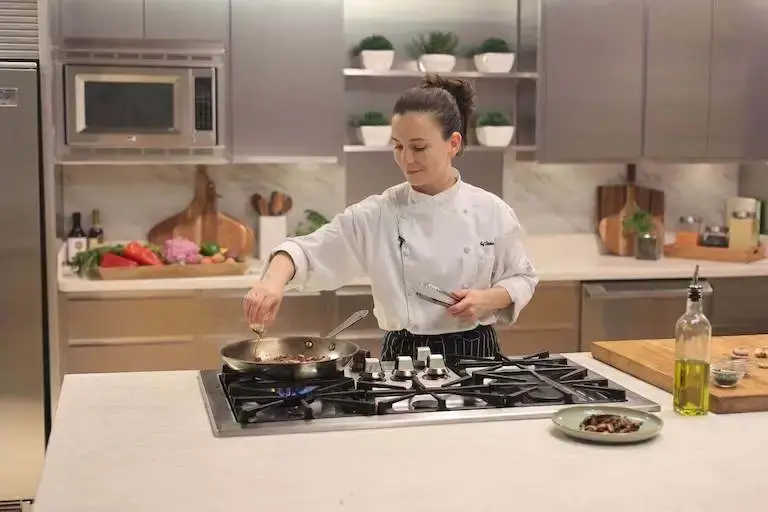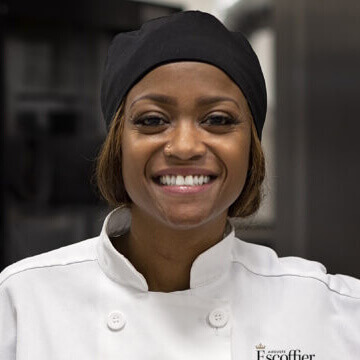Listen to This Article:
If you dream of cooking professionally but don’t want the high overhead of running a restaurant or food truck, a career as a personal or private chef might be a great fit. These roles can offer flexibility, creativity, and the chance to build lasting relationships with clients—all while doing what you love.
Either career path can be fulfilling, but they each require different schedules, expectations, and business models.
In this guide, we’ll walk through how you can become a personal or private chef, the skills and training you may need, and how a culinary education can set you apart from the competition.
What’s the Difference Between a Personal Chef and a Private Chef?
In short: while personal chefs typically prepare meals for multiple clients each week, private chefs work exclusively for one household, often as part of their full-time staff.
A personal chef typically works with multiple families on a rotating basis. They often make pre-made meals that the client can then heat-and-eat, allowing busy families to enjoy home-cooked meals without the time investment. Personal chefs usually work from their clients’ homes for a few hours at a time, preparing several days’ worth of meals in one session.
A private chef works for a single client or family and attends to all of their culinary needs on a more intensive basis. They may travel with the client and some even live in the client’s house, providing daily meal preparation, special event catering, and sometimes household management duties. Private chefs often work with high-net-worth individuals, celebrities, or busy executives.
“Being a really great restaurant chef does not always translate to being a great private chef,” Chef Brian Arruda, founder and CEO of Executive Chefs at Home, says, “I think that’s very important. Most people don’t realize that.”
This is because private chefs not only need technical expertise, but also adaptability, discretion, and the ability to build strong personal rapport within a client’s home environment.
Personal Chef vs. Private Chef: At a Glance
| Feature | Personal Chef | Private Chef |
|---|---|---|
| Client Type | Multiple clients | One individual, family, or household |
| Schedule | Flexible; choose your own hours | Set hours; often full-time (may include weekends or holidays) |
| Work Location | Typically in clients’ homes or a rented/commercial kitchen | In the client’s home or estate |
| Meal Prep Style | Often prepares weekly meals in advance | Prepares fresh meals daily and for events |
| Travel Requirements | Minimal or local | May involve frequent travel or live-in arrangements |
| Income Structure | Charges per meal, per service, or through packages | Typically salaried, may include benefits or bonuses |
| Creative Freedom | More control over menus and offerings | Must align menus closely with client preferences |
| Business Ownership | Runs own business | Typically an employee or long-term contractor |
| Startup Costs | Low to moderate (equipment, permits, marketing) | Minimal, but requires experience to get hired |
| Ideal For | Entrepreneurs who value independence and variety | Professionals seeking long-term stability and a close client relationship |
Why Culinary School Can Help You Succeed in Either Role
Whether you want to work with a rotating list of clients or cook daily meals for a single household, formal culinary education can set you apart. Depending on the program, students at Auguste Escoffier School of Culinary Arts may study foundational cooking techniques as well as instruction in areas like:
- Nutrition
- Menu planning
- Sanitation
- Entrepreneurship
In addition, industry externships can provide hands-on experience and the opportunity to build industry connections and a culinary network.

Culinary school can offer aspiring personal and private chefs the opportunity to build foundational skills, gain hands-on industry experience, and explore professional kitchen techniques that are often used in client-based cooking careers.
Personal chefs often rely on their culinary school experience to deliver high-quality, customized meals and to run their own businesses. Private chefs can benefit from formal training as they’re often expected to meet fine-dining standards in high-pressure environments.
In both careers, a professional education can support skill-building and credibility as you pursue your career goals.
How You Can Become a Personal Chef
Step 1 – Research Your Local Market & Choose a Niche
To best serve your community, you need to know who will need (and want) your services. Take time to figure out who will be looking for a personal chef in your market. Working moms? Bachelors? Busy families? Young professionals?
Market research can guide your business model—and help you cater to the clients you want to serve. It’s wise to figure out the need in your market, but it’s also a great idea to pick a niche and customize your service to attract a certain kind of clientele. Some personal chefs cater to specific groups. Escoffier Graduate Bree Chumley, for example, specializes in plant-based cuisine in her personal chef business.
Step 2 – Brand Yourself and Share Your Services
Make it easy for your clients to find you and explore what services you offer. Much of your new business may come from online searches—Google, Yelp, Facebook—so be sure your brand is clear and accessible.
You may need a high-quality website and solid marketing strategy to connect with the people in your target market. Share your new business on social media and consider asking friends and family to help promote your services.
You can also reach out to fellow students and mentors from culinary school or former colleagues to ask if they have any referrals.
As you start to build a client base, you can share pictures of your food and testimonials from happy clients to prove the quality of your services. You could also provide an incentive to current clients to help build your business (for example, for every successful referral, maybe the client can receive 10% off the next month’s services).

Personal chefs prep and portion meals to make them ready for clients to enjoy throughout the week.
Step 3 – Build Strong Customer Service Skills
Personal chefs are both professional cooks and service providers. While some clients will be happy for you to come up with their meals, others may have specific requests, favorite dishes, or dietary requirements. As the chef, it’s your job to deliver what they expect of you.
“You have to have all your senses engaged, especially as a personal chef, which I was for so many years,” says Lauren Lewis, a yogi and chef with expertise as a plant-based personal chef. “Five pots going in the oven, the pressure cooker chopping…and you just have to be there in the moment.”
Being present and attentive can allow you to deliver exactly what clients expect. Be sure to lay out your services very clearly; that can help you avoid confusion or disappointment down the road. And be prepared to receive feedback with grace. The customer may not always be right, but the chef should always be polite.
Step 4 – Establish Your Business Foundation
As a personal chef, you’re running your own small business, including all of its financial, legal, and operational aspects.
“We have chefs and sommeliers and servers, etc., who want to be independent contractors, not necessarily working for a company, (but) working for themselves,” says Chef Austin Yancey, CEO and Founder of Elite Personal Chefs. “And we unlock their entrepreneurial spirit, show them how to grow a brand or grow themselves with a higher earning potential (that’s) higher than most restaurants.”
At Escoffier, culinary arts students may receive instruction in entrepreneurship and business principles that can be invaluable to personal chefs.
You’ll also need to research your state and local requirements for setting up your own small business.
Take time to research:
- Operating permits
- Licenses
- Certifications
- State and local taxes
- Liability insurance
*Auguste Escoffier School of Culinary Arts does not provide legal advice. Always consult with a professional advisor before creating a new business entity!
Your pricing is another important detail. Plenty of good software options exist to help you with costing, taking into account the price of your ingredients and the number of patrons you serve. Be sure to build equipment into your budget as well—you may need to buy and maintain pots, pans, knives, to-go containers, and more.
*Information may not reflect every student’s experience. Results and outcomes may be based on several factors, such as geographical region or previous experience.
Step 5 – Join a Professional Organization
In the United States, there are two primary professional organizations for personal chefs—the United States Personal Chef Association and the American Personal & Private Chef Association. Both groups offer networking opportunities, “find a chef” directories to help potential clients find chefs, and special rates for liability insurance, among other benefits.
These groups can be good resources while you start your new business, offering everything from contract templates to pricing guidance. They can help add legitimacy to your company by demonstrating your commitment to professional standards and ongoing education in the field. The growing demand for personal chef services, projected to grow at 6.5% CAGR from 2024 to 2030, may create additional opportunities.
How Much Do Personal Chefs Make?
Many personal chefs earn $43,000–$90,000 annually, with room to grow as a premium service. The average annual salary in America for a personal chef is $69,673.
Typical pricing structures include per meal, per service, or weekly packages, allowing chefs to choose the model that works best for their business and client base. Rates vary widely by region and niche—for example, $200–$600+ per client per week. Income depends on the number of clients and how you scale your business.
How You Can Become a Private Chef

Private chef making sauteed mushrooms in a modern residential kitchen—many private chefs work in upscale home environments, preparing meals tailored to their client’s tastes and schedule.
Step 1 – Get Fine Dining Experience
Private chef roles typically require three to five years of experience in professional kitchens to develop the necessary skills. This experience should include working in high-end restaurants, luxury hotels, or catering companies where you’ll learn to work under pressure and meet exacting standards.
Focus on building technical expertise, speed, and consistency in your cooking, as private chef roles often require restaurant-quality meals prepared on demand. You may need to demonstrate proficiency in multiple cuisines, accommodating dietary restrictions, and presenting dishes with finesse.
*Information may not reflect every student’s experience. Results and outcomes may be based on several factors, such as geographical region or previous experience.
Step 2 – Network and Build Your Reputation
Connect with staffing agencies that specialize in domestic placement, build relationships through referrals from industry contacts, and explore yacht and private estate job boards where these positions are commonly posted. Many private chef positions are not publicly advertised, making networking a crucial aspect.
“If you’re a chef of a restaurant, go spend some time on the floor,” Chef Brian Arruda, founder & CEO of Executive Chefs at Home, advises. “Talk to your guests. Show a face. Don’t just stay in the kitchen the whole time. Build relationships. Really, that’s what I did… Network, network, network. Talk to everybody. Always talk to everybody. Don’t be the guy who is closed off.”
Building strong relationships and expanding your professional network can open doors to opportunities you may never see posted publicly.
Emphasis on confidentiality and professionalism is crucial, as private chefs often work with high-profile clients who value discretion above all else. Your reputation for maintaining privacy and conducting yourself professionally can determine your access to the best opportunities.
Step 3 – Understand the Lifestyle
Private chef roles often involve full-time or live-in arrangements that can significantly impact your personal life and living situation. Understanding these demands upfront can help you decide whether this career path aligns with your lifestyle goals and family obligations.
Be prepared for roles that may involve extensive travel, unusual hours based upon your employer’s schedule, and signing non-disclosure agreements to protect client privacy. The demanding nature of these positions can require flexibility and adaptability.
Step 4 – Prepare to Negotiate a Contract
Key negotiation points include:
- Salary expectations
- Housing arrangements (if live-in)
- Paid time off policies
- Travel expectations with associated compensation
Understanding industry standards can help you negotiate fair terms that protect your interests.
Consider the long-term career trajectory and earning potential. Private chefs may build long-term relationships that open the door to new opportunities.
How Much Do Private Chefs Make?
Most private chef positions are salaried rather than hourly, with bonuses for special events, paid time off, and sometimes housing included as part of the compensation package.
According to the U.S. Bureau of Labor Statistics, the median annual wage for chefs and head cooks was $60,990 in May 2024. However, private chefs often earn significantly more due to the personalized nature of their work. Indeed reports that the average salary for a private chef in the United States is approximately $98,930 per year (as of early July 2025; figures are updated regularly). Earnings can vary depending on factors such as formal culinary training, years of experience, location, and the level of service required by the client.
Key factors affecting compensation include:
- Geographic location (with major metropolitan areas and luxury resort destinations paying premium rates)
- Years of relevant experience
- Type of client (celebrities, executives, or wealthy families each have different expectations)
- Additional travel or live-in perks that reduce personal living expenses
Build a Culinary Career That Fits Your Life
Becoming a personal or private chef can offer a deeply rewarding way to share your culinary talent. Whether you prefer the variety of working with different families or the stability of serving one exclusive client, both paths can allow you to turn your passion into a profession.
With training in areas like culinary technique and entrepreneurship, Escoffier can help you build a strong foundation as you pursue your career goals. From kitchen skills to business strategy to industry connections, your education can serve as a starting point.
Ready to get started? Contact us today to find out more about Escoffier’s programs and how you can begin your journey toward becoming a personal or private chef. You can also explore our tuition and financial aid options, available for those who apply and qualify, to find the program that best fits your budget and schedule.
READ MORE ABOUT FOOD ENTREPRENEURSHIP WITH THESE ARTICLES:
- The Complete Guide to Starting a Home-Based Catering Business
- How to Start a Food Business from Home
- 15 Culinary Careers Outside of the Kitchen
This article was originally published on March 17, 2016, and has since been updated.


